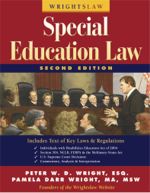On Monday, October 1, the Court heard Oral argument in New York Bd of Ed v. Tom F.
On Wednesday, October 10, the United States Supreme Court issued a decision in this case. Justice Kennedy, author of the pro-parent decision in Winkelman v. Parma, recused himself. The decision was split, 4-4.
What does this decision mean to you?
The favorable decision on behalf of the parents and child stands for families who live in the Second Circuit - Connecticut, New York, and Vermont.
However, the failure of the Supreme Court to issue a definitive ruling on this issue means that the case has no precedential value beyond the 2nd Circuit.
The decision is, in essence, a nullity, i.e., the case never went beyond the 2nd Circuit.
You can read the decision in Tom F. at:
https://www.wrightslaw.com/law/caselaw/ussupct.nyc.tomf.pdf
"First Bite of Failure Not Required by the IDEA" - Frank G. v. Hyde Park Central School District
However, the story may not end here. Tom F. is intertwined with another case from the 2nd Circuit, Frank G. v. Hyde Park Central School District.
In Frank G., the parents prevailed in a tuition reimbursement case before the U. S. Court of Appeals for the Second Circuit. The school district's argument was essentially the same as in Tom F.- that parents are not entitled to tuition reimbursement unless their child was previously enrolled in the public school's special education program.
The U. S. Court of Appeals for the Second Circuit described the "absurd results" this argument would cause:
"It would, for instance, prevent children who are provided with inadequate IEPs from receiving a free appropriate public education if their disabilities were detected before they reached school age."
"It would also place the parents of children with disabilities in the untenable position of acquiescing to an inappropriate placement in order to preserve their right to seek reimbursement from the public agency that devised the inappropriate placement."
After the parents prevailed in Frank G., the school district appealed to the U.S. Supreme Court.
Briefs have been filed regarding whether the Court should or should not hear the school district's appeal.
After briefs were filed, they were distributed for a conference of the Justices that was scheduled for February 16, 2007. No rulings or orders were issued. The briefs were distributed again to the Justices on February 20 for a conference scheduled for February 23, 2007.
On Monday, October 10, briefs were again distributed to the Justices for a conference on Friday, October 12.
The Supreme Court has taken no action in deciding whether to grant or deny certiorari. The Supreme Court has left the door open to re-visit the legal issue that was the focus of the Tom F case.
Question - If Justice Kennedy has to recuse himself again, will the Court grant cert in Frank G.?
If Justice Kennedy does not recuse himself, the Court may grant cert on Frank G. tomorrow, October 12. This will give the Court another shot at resolving this legal issue.
To follow the Frank G. case, check the Supreme Court docket sheet at:
http://www.supremecourtus.gov/docket/06-580.htm.
More Memorable Quotes from Frank G.
"The plain language of 20 U.S.C. § 1412(a)(10)(C)(ii) does not say that tuition reimbursement is only available to parents whose child had previously received special education and related services from a public agency, nor does it say that tuition reimbursement is not available to parents whose child had not previously received special education and related services."
"This brings us to the last rule of statutory construction applicable here. This rule, as we previously observed, is that ambiguous statutes are to be construed so as to avoid absurd results. It would, for instance, prevent children who are provided with inadequate IEPs from receiving a free appropriate public education if their disabilities were detected before they reached school age. It would also place the parents of children with disabilities in the untenable position of acquiescing to an inappropriate placement in order to preserve their right to seek reimbursement from the public agency that devised the inappropriate placement."
"Such a result, it has been suggested, 'ensures that a parent's rejection of a public school placement is not based on mere speculation as to whether the recommended school placement would have been appropriate.'
This suggestion turns on the erroneous assumption that parents would have to keep their child in a public school placement until it was clear that their 'speculation' was borne out by a wasted year of actual failure. Such a "first bite" at failure is not required by the IDEA. (emphasis added)
"We believe that it is unreasonable to suggest that Anthony's parents were legally required to engage in such a useless and potentially counterproductive exercise, given Anthony's 'need for constant and consistent care, even brief periods of inappropriate schooling could lead to tremendous educational, social, emotional, and psychological deterioration.'"
"We decline to interpret 20 U.S.C. § 1412(a)(10)(C)(ii) to require parents to jeopardize their child's health and education in this manner in order to qualify for the right to seek tuition reimbursement.
|
Wrightslaw: Special Education Law, 2nd Edition (ISBN: 978-1-892320-16-2, 456 pages) by Peter Wright and Pamela  Wright is available in two formats, a print book and a print & e-book combo. The book includes: Wright is available in two formats, a print book and a print & e-book combo. The book includes:
- Full text of the Individuals with Disabilities Education Act of 2004 and IDEA 2004 regulations with analysis and commentary
- Section 504 of the Rehabilitation Act
- No Child Left Behind Act
- Family Education Rights and Privacy Act (FERPA)
- McKinney-Vento Homeless Act
- Decisions in special education cases from the U. S. Supreme Court
- References and resources
Formats How to Order Discounts The E-book
Synopsis Table of Contents About the Authors Early Reviews
Wrightslaw: Special Education Law, 2nd Edition is designed to meet the needs of parents, teachers, advocates, attorneys, related services providers, school psychologists, administrators, college professors, hearing officers, and employees of district and state departments of education. |


 Wright is available in
Wright is available in 


